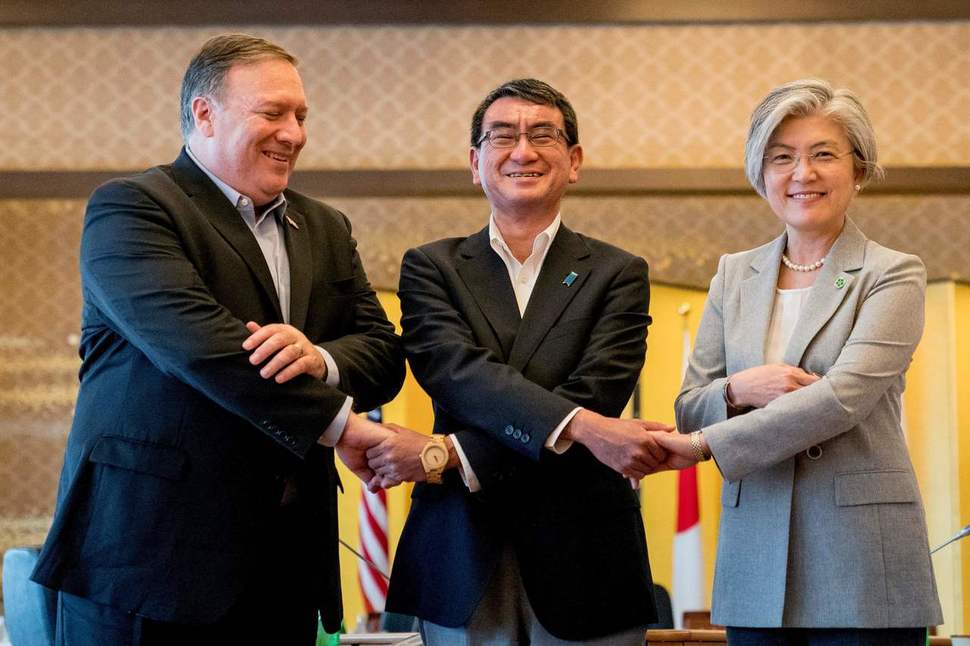 |
|
Kim Yong-chol, Vice Chairman of the Central Committee of the Workers‘ Party of Korea (WPK), and US Secretary of State Mike Pompeo
|
US Secretary of State says “road ahead will be difficult and challenging”
On July 8, US Secretary of State Mike Pompeo said that progress had been made during his high-level talks with Workers’ Party of Korea Vice Chairman Kim Yong-chol that were held in Pyongyang on July 6-7 and that North Korea had promised to dismantle its intercontinental ballistic missile (ICBM) engine testing site. But after the high-level talks, North Korea and the US have revealed that they sharply disagree on the method of implementing the joint statement that resulted from the North Korea-US summit on June 12, including compensation for the North’s denuclearization, suggesting that an intense battle of nerves is in store. During a joint press conference with South Korean Foreign Minister Kang Kyung-wha and Japanese Foreign Minister Taro Kono after Pompeo met the two diplomats in Tokyo on July 8, Pompeo said that he had had two days of good-will negotiations with Kim Yong-chol and that North Korea had confirmed its commitment to complete denuclearization and the two sides had discussed repatriating the remains of American service members. Pompeo emphasized that these efforts would make the world safer. While speaking to the pool of reporters before departing Pyongyang after his meeting with Kim on July 7, Pompeo said that progress had been made in nearly all the main areas being disputed and that the US and North Korea had agreed to hold a working-level meeting in Pyongyang on July 12 to return the remains of American soldiers. While accompanying Pompeo on his trip on the morning of July 7, State Department Spokesperson Heather Nauert had mentioned that North Korea and the US had agreed to set up a working-level group to discuss key issues, including the verification of denuclearization. Given this remark, the high-level talks appear to have resulted in a generic agreement about setting up a framework for working-level deliberations on each major point of disagreement that is necessary for implementing the June 12 joint statement. That said, the Americans’ announcement has yet to be confirmed by the North Koreans. “The US side came up only with its unilateral and gangster-like demands for denuclearization, just calling for CVID, declaration and verification, all of which run counter to the spirit of the Singapore summit meeting and talks. [. . .] The results of the talks have made us apprehensive,” the spokesperson of the North Korean Foreign Ministry said in a statement made available to the outside world via the Korean Central News Agency (KCNA) on the evening of July 7. Though the North Korean statement criticized the American attitude, it did not mention lifting sanctions. The statement also emphasized that the North Koreans “still cherish our good faith in President Trump.” Pompeo shot back during the press conference following his meeting with the South Korean and Japanese foreign ministers on July 8 that “if [our] requests were gangster-like, [. . .] the world is a gangster.” “Let me make clear North Korea reaffirmed its commitment to complete denuclearization,” Pompeo said, then continued: “Sanctions [on the North] will remain in place until final, fully verified denuclearization, as agreed to by Chairman Kim, occurs.” Pompeo also raised eyebrows by using the expression “maximum pressure” for the first time in more than a month in a tweet following his bilateral meeting with Kono. High-ranking American officials have not used that phrase since around the time that Kim Yong-chol visited the US on June 1. At the time, Trump said he preferred not to use the phrase because North Korea and the US were moving closer together. Generally speaking, the two sides appear to have hit their first speed bump during the high-level talks as they work to implement the June 12 joint statement. During the press conference, Pompeo said that “the road ahead will be difficult and challenging,” while the North Korean statement expressed concerns about the possibility of a “contrary wind” starting to blow. In regard to the fact that Pompeo did not have a personal meeting with Kim Jong-un during his third visit to North Korea, Pompeo said he had not necessarily expected to meet the North Korean leader. By Lee Je-hun, senior staff writer, Cho Ki-weon, Tokyo correspondent, and Yi Yong-in, Washington correspondent Please direct comments or questions to [english@hani.co.kr]






